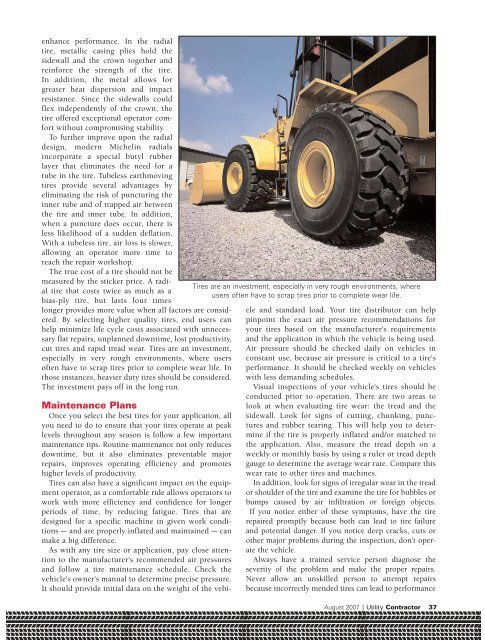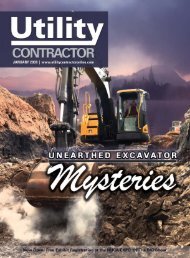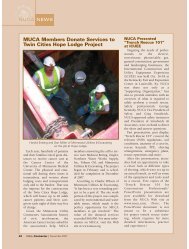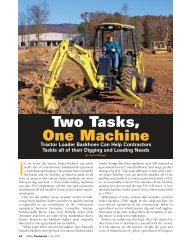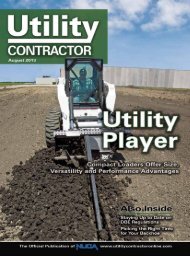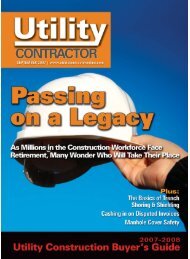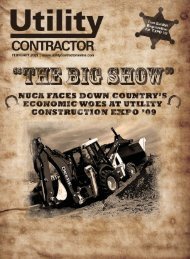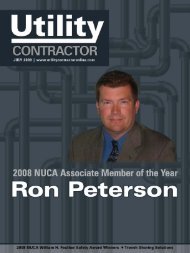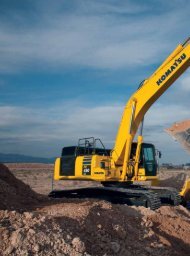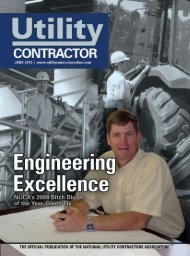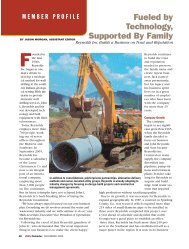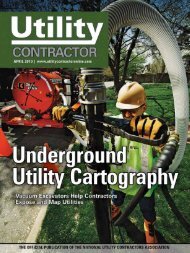View Full August PDF Issue - Utility Contractor Online
View Full August PDF Issue - Utility Contractor Online
View Full August PDF Issue - Utility Contractor Online
- No tags were found...
Create successful ePaper yourself
Turn your PDF publications into a flip-book with our unique Google optimized e-Paper software.
enhance performance. In the radialtire, metallic casing plies hold thesidewall and the crown together andreinforce the strength of the tire.In addition, the metal allows forgreater heat dispersion and impactresistance. Since the sidewalls couldflex independently of the crown, thetire offered exceptional operator comfortwithout compromising stability.To further improve upon the radialdesign, modern Michelin radialsincorporate a special butyl rubberlayer that eliminates the need for atube in the tire. Tubeless earthmovingtires provide several advantages byeliminating the risk of puncturing theinner tube and of trapped air betweenthe tire and inner tube. In addition,when a puncture does occur, there isless likelihood of a sudden deflation.With a tubeless tire, air loss is slower,allowing an operator more time toreach the repair workshop.The true cost of a tire should not bemeasured by the sticker price. A radialtire that costs twice as much as abias-ply tire, but lasts four timeslonger provides more value when all factors are considered.By selecting higher quality tires, end users canhelp minimize life cycle costs associated with unnecessaryflat repairs, unplanned downtime, lost productivity,cut tires and rapid tread wear. Tires are an investment,especially in very rough environments, where usersoften have to scrap tires prior to complete wear life. Inthose instances, heavier duty tires should be considered.The investment pays off in the long run.Tires are an investment, especially in very rough environments, whereusers often have to scrap tires prior to complete wear life.Maintenance PlansOnce you select the best tires for your application, allyou need to do to ensure that your tires operate at peaklevels throughout any season is follow a few importantmaintenance tips. Routine maintenance not only reducesdowntime, but it also eliminates preventable majorrepairs, improves operating efficiency and promoteshigher levels of productivity.Tires can also have a significant impact on the equipmentoperator, as a comfortable ride allows operators towork with more efficiency and confidence for longerperiods of time, by reducing fatigue. Tires that aredesigned for a specific machine in given work conditions— and are properly inflated and maintained — canmake a big difference.As with any tire size or application, pay close attentionto the manufacturer's recommended air pressuresand follow a tire maintenance schedule. Check thevehicle's owner's manual to determine precise pressure.It should provide initial data on the weight of the vehicleand standard load. Your tire distributor can helppinpoint the exact air pressure recommendations foryour tires based on the manufacturer's requirementsand the application in which the vehicle is being used.Air pressure should be checked daily on vehicles inconstant use, because air pressure is critical to a tire'sperformance. It should be checked weekly on vehicleswith less demanding schedules.Visual inspections of your vehicle's tires should beconducted prior to operation. There are two areas tolook at when evaluating tire wear: the tread and thesidewall. Look for signs of cutting, chunking, puncturesand rubber tearing. This will help you to determineif the tire is properly inflated and/or matched tothe application. Also, measure the tread depth on aweekly or monthly basis by using a ruler or tread depthgauge to determine the average wear rate. Compare thiswear rate to other tires and machines.In addition, look for signs of irregular wear in the treador shoulder of the tire and examine the tire for bubbles orbumps caused by air infiltration or foreign objects.If you notice either of these symptoms, have the tirerepaired promptly because both can lead to tire failureand potential danger. If you notice deep cracks, cuts orother major problems during the inspection, don't operatethe vehicle.Always have a trained service person diagnose theseverity of the problem and make the proper repairs.Never allow an unskilled person to attempt repairsbecause incorrectly mended tires can lead to performance<strong>August</strong> 2007 | <strong>Utility</strong> <strong>Contractor</strong> 37


